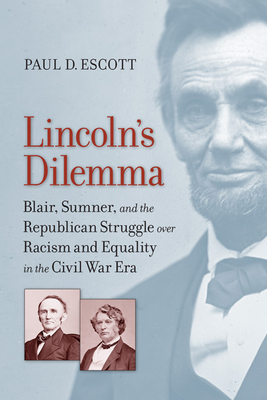

 University of Virginia Press
University of Virginia Press
Lincoln's Dilemma: Blair, Sumner, and the Republican Struggle Over Racism and Equality in the Civil War Era


Key Metrics
- Paul D Escott
- University of Virginia Press
- Hardcover
- 9780813936192
- 9.37 X 6.22 X 0.92 inches
- 1.16 pounds
- History > United States - Civil War Period (1850-1877)
- English
 Secure Transaction
Secure TransactionBook Description
The Civil War forced America finally to confront the contradiction between its founding values and human slavery. At the center of this historic confrontation was Abraham Lincoln. By the time this Illinois politician had risen to the office of president, the dilemma of slavery had expanded to the question of all African Americans' future. In this fascinating new book Paul Escott considers the evolution of the president's thoughts on race in relation to three other, powerful--and often conflicting--voices.
Lincoln's fellow Republicans Charles Sumner and Montgomery Blair played crucial roles in the shaping of their party. While both Sumner and Blair were opposed to slavery, their motivations reflected profoundly different approaches to the issue. Blair's antislavery stance stemmed from a racist dedication to remove African Americans from the country altogether. Sumner, in contrast, opposed slavery as a crusader for racial equality and a passionate abolitionist. Lincoln maintained close personal relationships with both men as he wrestled with the slavery question. In addition to these antislavery voices, Escott also weaves into his narrative the other extreme, of which Lincoln was politically aware: the virulent racism and hierarchical values that motivated not only the Confederates but surprisingly many Northerners and which were embodied by the president's eventual assassin, John Wilkes Booth.
Sumner, Blair, and violent racists like Booth each represent forces with which Lincoln had to contend as he presided over a brutal civil war and faced the issues of slavery and equality lying at its root. Other books and films have provided glimpses of the atmosphere in which the president created his Emancipation Proclamation. Lincoln's Dilemma evokes more fully and brings to life the men Lincoln worked with, and against, as he moved racial equality forward.
A Nation Divided: Studies in the Civil War Era
Author Bio
Paul D. Escott earned his B.A. degree cum laude from Harvard College and his Master’s and Ph.D. degrees from Duke University. He taught at UNC Charlotte before coming to Wake Forest, where he served for nine years as Dean of the College.
He is a member of Phi Beta Kappa, has received fellowships from the Whitney Young, Jr., Foundation and the Rockefeller Foundation, and twice won an award for the best non-fiction book published by a resident of North Carolina.
His most recent book is Lincoln’s Dilemma: Blair, Sumner, and the Republican Struggle over Racism and Equality in the Civil War Era.
He comments: “The history of the Civil War Era looms large in our nation’s struggles to overcome racism and realize its ideals of freedom and equality. Even today popular culture misrepresents the reality of the Civil War era in ways that obscure our understanding of our society’s past. Excessive glorification of the Confederacy or the Union can blind us to the nature of the problems that the United States has had to surmount or struggles with still.”
- Education
- B.A. Harvard College 1969
M.A. Duke University 1972
Ph.D. Duke University 1974
Source: Wake Forest University
Videos
No Videos
Community reviews
Write a ReviewNo Community reviews